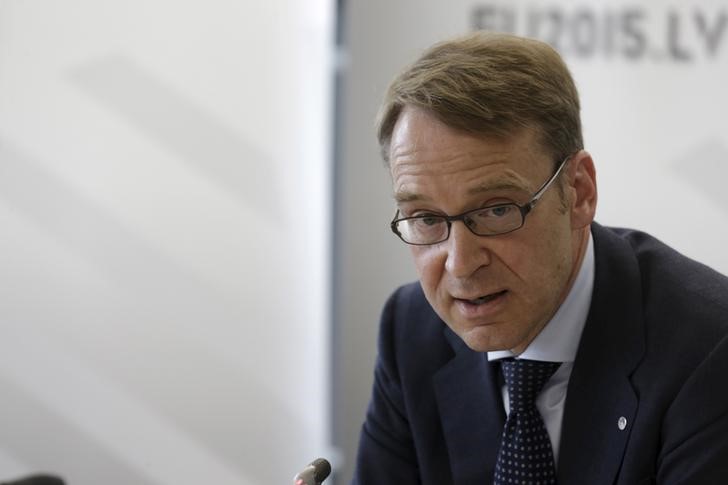By John O'Donnell
FRANKFURT (Reuters) - The European Central Bank held a crucial cash lifeline for Greece unchanged on Thursday, a person familiar with the discussion said, as the head of the Bundesbank objected to the way Greek banks are being funded.
ECB policy-setters held the limit on their emergency funding for the banks steady for the second day running, a source familiar with their talks said, having previously increased it steadily over many weeks.
Greece's central bank may not have asked for an increase, though the country's lenders have seen their reserves dwindle daily as savers spooked by the prospect of default continue to withdraw cash.
It is not clear how much longer they can cope without further hikes in such funding back-up, raising pressure on the government in Athens as time runs out for it to agree a cash-for-reforms deal with its creditors to avert a default.
Bankers in Greece have said outflows have eased in the last days in anticipation of a deal, with some savers who pre-ordered withdrawals last Friday not pulling out the full amounts on Monday as sentiment improved.
Provided the ECB raises the funding ceiling when needed, banks still have eligible collateral to tap emergency liquidity from the Bank of Greece. In mid-May they had about 40 billion euros of such collateral to draw funds from the credit line.
Bundesbank President Jens Weidmann on Thursday gave his strongest criticism yet of the use of emergency credit to prop up Greece's banks. Weidmann said those banks should not continue to buy the short-term debt of their government.
"The Eurosystem must not provide bridge financing to Greece even in anticipation of later disbursements," said Weidmann, who also sits on the European Central Bank's Governing Council, which approves such funding, dubbed Emergency Liquidity Assistance (ELA).
"When banks without access to the markets buy debt of a sovereign which is likewise locked out of the market, taking recourse to ELA raises serious monetary financing concerns," he said at a conference in Frankfurt.
Earlier this week, politicians in Ireland and Germany voiced similar concerns.
WARY OF SPEAKING OUT
The objections of Germany's central bank, respected as a guardian of monetary order in the euro zone's biggest economy, are significant although it alone cannot stop the ELA, currently at about 89 billion euros ($100 billion), being extended to Greece's banking sector.
Greece's ruling Syriza party has dismissed reform demands from the country's international creditors as "blackmail", just as crisis talks to avert a debt default and a euro zone exit entered a critical phase.
As president of the Bundesbank, Weidmann also sits on the ECB's Governing Council, which holds daily phone calls to discuss the extension of ELA. This group can restrict such funding if a two-thirds majority agrees.
Others too have concerns about the funding lifeline although they have been wary about speaking out, not wanting to be accused of triggering Greece's financial collapse, one person who attends the meetings of central bank chiefs recently told Reuters.
This could now change, as some countries typically fall in behind the Bundesbank.

($1 = 0.8929 euros)